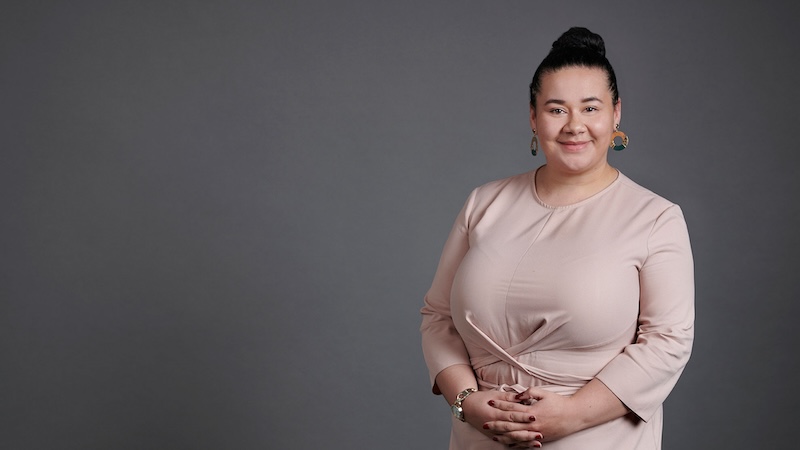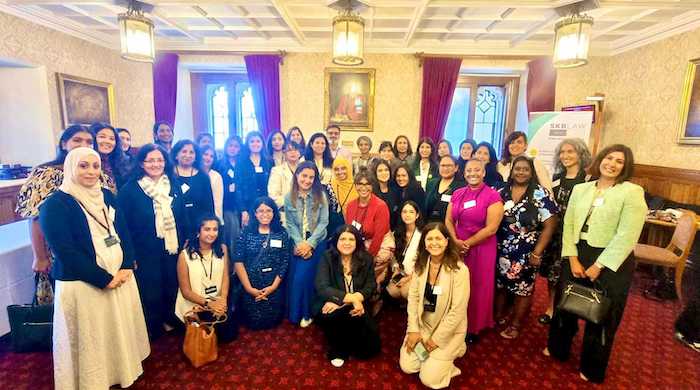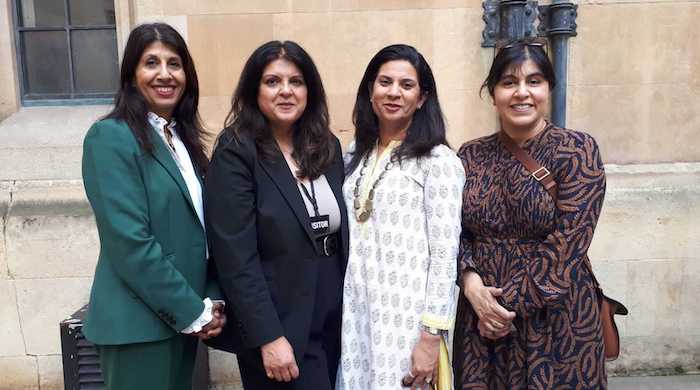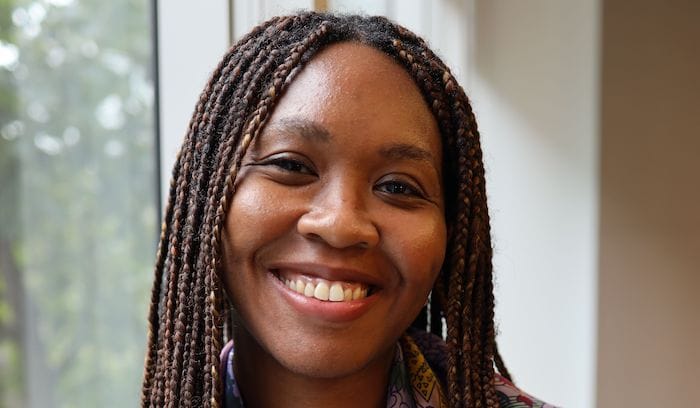From a late decision to study law to becoming a partner at Slaughter and May, Lorna Nsoatabe shares how embracing opportunities, valuing people, and staying optimistic have shaped her journey

I wasn’t particularly set on law from a young age,” admits Lorna Nsoatabe, partner at Slaughter and May. During her A-levels, she leaned towards studying medicine before a final decision to study law at university. She enjoyed her degree but hadn’t yet decided what she’d like to do after graduating. What she did know was that she wanted a job involving people, teamwork, and challenge. Seeing many peers apply to commercial law firms, she decided to give it a go — reasoning that it would tick those boxes and make good use of her degree. “I applied, without a huge amount of thought about what’s going to happen in 10 years, but more just, I think I’ll enjoy the immediate life as a trainee and hopefully be good at it,” she recalls.
That leap of faith paid off. Nsoatabe began her training contract with the firm in 2012, gaining experience across corporate, financing, competition, real estate and Disputes and Investigations. It was her competition seat that clicked, and she qualified into the group in 2015. Looking back, she says her progression wasn’t pre-planned but the result of seizing opportunities — she worked hard so that “when the next step came, I was ready to take it.”
But why competition? She loved the team, describing a supportive department where everyone worked hard but “didn’t take themselves too seriously” — the mix of humour, humility and excellence was very appealing. The work also appealed. “I wanted to use my law degree while also understanding how clients work and explore the business side of things — even using my maths a little bit.” It combined legal analysis, commercial awareness, and a touch of economics and policy. She “really likes the mix of that business, law and economics” and found that combination “just worked for me.”
Competition also appealed because it is a ‘people’ practice area. “It’s a real people department,” she tells Legal Cheek Careers, involving constant interaction with business teams, in-house counsel, boards and CEOs — an aspect she still enjoys. Years on, her favourite part of the job remains “the people aspect” above all.
To succeed in competition law, Nsoatabe emphasises the importance of the human element as much as the technical. Strong legal skills are essential, but so are communication skills and common sense. “Can you get clients to talk to you and share what’s concerning them? Share what they really want to happen so you can help them make it happen?” she asks. Building trust enables you to truly help the client, while good judgment and pragmatism are key to finding sensible paths forward.
Shifting to the firm, she highlights the appeal of Slaughter and May’s multi-specialist approach. Lawyers at the firm aren’t confined to narrow specialisms; instead, they work across a broad practice area, handling the wide range of matters within it. This ethos brings variety — “nothing is boring, you get genuinely new things every day” — and the challenge of constantly pushing beyond your comfort zone. While this is not for everyone, she explains that “there are real benefits for our lawyers, who develop excellent legal skills and our clients who work with lawyers able to support them on a range of matters”.
This breadth fosters collaboration. “We rely on our colleagues to share their expertise,” she explains. People readily call each other for advice, creating a “really supportive” and notably uncompetitive environment where, as she puts it, “we talk to each other, instead of competing”.
Another distinctive feature is Slaughter and May’s international approach. Rather than a large global network, the firm partners with the leading independent firms in each jurisdiction. This model “encourages us to communicate really well” and consistently deliver excellent work so that each overseas partner “thinks, ‘yes, I want to work with the firm again’”. Clients, in turn, benefit from seamless, high-quality service across multiple jurisdictions.
For Nsoatabe, the multi-specialist philosophy keeps her work exciting. “If my client has any issue across the whole realm of what Competition law involves, I’m able to help,” she explains. That means continually encountering unique legal scenarios and learning new skills, but also developing a really in-depth understanding of her clients. This broad base also sharpens her as an adviser when it comes to spotting potential issues which may impact a client.
Now over a decade into her career, she notes the fundamentals have stayed the same as she rose from trainee to partner — but expectations evolve. As a junior, everything was new but as a senior, you’re expected to handle the unfamiliar with confidence. Even so, new things still come across her desk, and the firm’s training equips lawyers at all levels to tackle “cutting-edge issues no one’s seen before”.
Outside client work, Nsoatabe has championed diversity and inclusion. As an associate, she spent nearly seven years chairing the firm’s diversity network, which celebrates and promotes racial and ethnic diversity. Now, as a partner, she continues as the group’s sponsoring partner, mentoring leaders and advocating for the network in management. “I’m there in a supportive capacity and as a sounding board,” she says. The mission is to “make the firm better, make it more inclusive — a working environment in which anyone, irrespective of your background, can develop and thrive.”
One of the network’s highlights is the annual Carnival event — a celebration inspired by the Caribbean carnival, with music, food, steel drums, and a talk about Carnival’s history. The event brings colleagues together for fun and learning, becoming a highlight of the year. What Nsoatabe finds most rewarding is seeing young colleagues take the lead. Trainees, junior associates and others across the non-legal teams, are encouraged to run events and bring ideas to life. Empowering junior staff has been “a really lovely thing,” she says, and cites witnessing their enthusiasm and success as her proudest achievement.
Nsoatabe believes diversity networks are much more than just PR. They foster inclusion and belonging, which in turn boosts young lawyer’s confidence. “You meet people who are like you, who think like you, who have had the same experiences as you… you have that space to have a conversation, to discuss things that might be difficult or challenging for you,” she explains. They also drive practical change by advising HR and leadership on cultural considerations or current events impacting colleagues. Having a dedicated group for these issues ensures “genuine change and impact can happen”.
Looking at the wider profession, Nsoatabe is hopeful but realistic. “We’ve seen a huge amount of growth in the last 10 years,” she notes, but there’s more to do before the profession truly reflects people from all backgrounds. Her wish is simple: that progress continues so that, in 10 or 15 years, diversity is “just a given” and every organisation knows how to create an inclusive workspace.
As we wrap up, she offers advice for aspiring lawyers. Firstly, enjoy it. “I think it can be a really great job and a really rewarding job,” she says. “Lean into enjoying it and try and have the best time possible”. Take up opportunities, get involved, and “put your hand up for things”. That said, if something isn’t right, don’t simply give up. Instead, speak up and try to make it better: “If you’re not enjoying it, or there’s something that you think can be done differently, try and make a bit of change.” In her experience, people are often receptive: “oh yes, you’re entirely right, we haven’t thought about that, how can we do better?”
Finally, she urges an optimistic mindset. Every generation faces challenges, but “being positive about your own career and about what you want from it, is a much better place to be than just worrying about it. Work hard, stay positive, and never forget the people around you.”
Lorna Nsoatabe will be speaking at ‘What does a world of difference look like? With Slaughter and May’, a virtual student event taking place Tuesday 16 September. Secure your place now.
About Legal Cheek Careers posts.




















